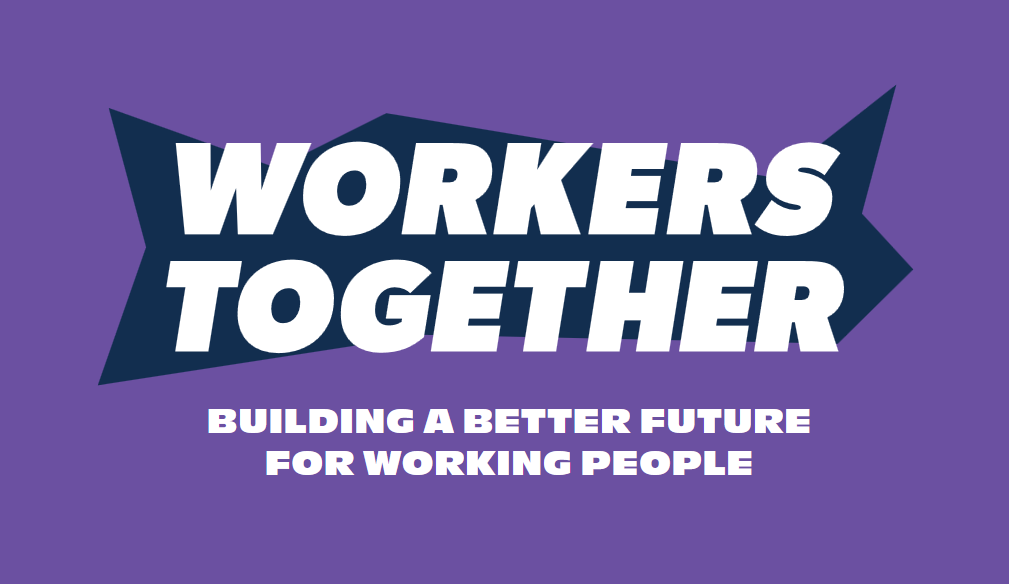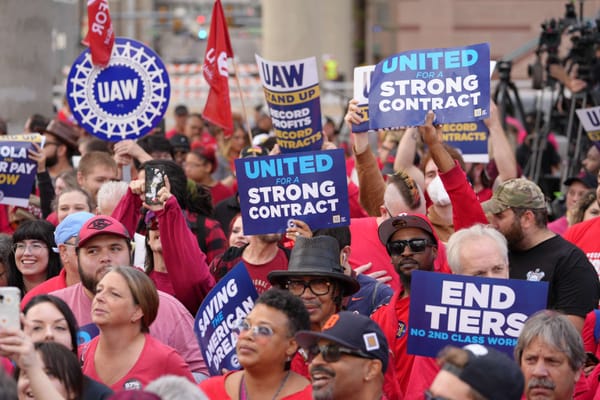
Could it be that conservative and right-wing populist appeals to the working class are more than just vulgar opportunism?
This past Labour Day, Conservative Party Leader Erin O’Toole released a video blaming “big government,” “corporate elites” and “bad trade deals” for Canada’s ailing manufacturing and resource sectors, pitching his “Canada First” economic strategy as an alternative. This justifiably worried some on the left.
O’Toole, like Premier Doug Ford in Ontario before him, is of course partly cribbing from the Donald Trump playbook, perhaps looking to peel off some votes from disgruntled and displaced workers in Ontario’s growing rustbelt.
While union leadership will work to defeat right-populist politicians at the polls, the appeals of Trump, O’Toole and other such politicians should be seen as attempts to by-pass union leadership and speak directly to disgruntled workers.
It’s tempting to write this type of right-wing, supposedly ‘pro-worker’ messaging off as nothing more than electoral opportunism. We can easily point to the list of harmful policies that Conservatives have implemented or pursued across Canada — free trade, corporate tax cuts, attacks on unions, opposition to minimum wage increases, etc. However, poking holes in the new conservative, pro-worker narrative won’t be enough. Insofar as right-wing politicians who are courting workers’ votes are at least speaking to working-class concerns, the left needs a coherent response.
There’s also growing evidence that right-wing overtures to the working class are more than just words. Outfits such as American Compass in the United States are pushing their own brand of pro-worker, ‘family-friendly’ conservative policy agenda. The American populist right is seemingly in the process of shedding the buffoonery and boorishness associated with Trump and attempting to cohere a nominally pro-worker platform.
To counter this, we need to clearly differentiate left-wing responses to pressing social and economic issues from those offered by the right. Conservatives can only offer reactionary (and ultimately unworkable) answers to the real problems facing workers.
Pro-worker and pro-union conservatives seem oxymoronic, but there’s a growing number of right-wingers who claim they’re supportive of unions and collective bargaining.
The average union member today is a woman working in the public sector. However, these workers aren’t who right-wingers target with their rhetoric; conservatives remain fundamentally opposed to public sector unions.
Instead, their pro-worker message is tailored to current or former private sector union members, in manufacturing, resources and building trades in particular. These industries and the unions in them have historically been dominated by men and are largely white (though less so now). And although we often associate deindustrialization and manufacturing job loss with white workers, these have also been economically harmful to racialized workers in many regions.
For the most part, right populist ‘pro-union’ posturing is directed at ‘free trade,’ accompanied by a heavy dose of China bashing. Of course, China isn’t the only target, as Mexico gets its fair share of vitriol as well. On this front, sections of the labour movement haven’t helped matters. Calling for ‘buy American’ campaigns or to ‘boycott’ Mexican-made vehicles only feeds racism and xenophobia.
Such nationalist anti-free trade rhetoric misdiagnoses the problem and offers no credible solution. Chinese workers — or any other workers in the Global South, for that matter — didn’t ‘steal’ Canadian jobs; Canadian and American corporate elites wanted access to cheap labour to solve their profitability crises, and their allies in government delivered.
Moreover, the pro-worker right imagines that we can turn back the clock on corporate globalization and return outsourced or redundant manufacturing jobs. Whether they genuinely believe this or not is anyone’s guess. They are, however, wrong.
So long as profit remains the sole criteria for determining what gets produced and where, there will be no ‘re-shoring’ of lost manufacturing jobs. Only public investment in well-paying jobs can solve the growing crisis of a lack of secure employment.
There also seems to be a bit of a disconnect between right populist politicians and the new brand of conservative, pro-worker policy wonk.
The Trumpist appeal, while directed broadly at workers harmed by corporate globalization, was also calibrated to capitalize on and stoke racist and sexist resentment. Proponents of this right-wing strategy sought to speak to the visceral pain caused by corporate globalization, while separating themselves from the bipartisan forces behind this neoliberal political project. How this brand of politics would relate to unions in practice was always fraught.
On the other hand, conservative thinkers, such as Oren Cass and others associated with American Compass, cast their net more broadly. They imagine trade unions as quintessentially conservative institutions of direct democracy, able to replace many functions of the welfare state.
Collective bargaining, for such conservatives, potentially offers a way to achieve a fairer economic distribution for private sector workers with less social spending and public intervention. They want to see more benefits attached to employment and a smaller welfare state. (Loss of employer-provided health insurance during the pandemic should be enough to demonstrate the awfulness of this idea.)
How pro-union conservatives plan to convince recalcitrant employers of the virtues of collective bargaining is unclear.
The social functions that pro-worker conservatives do propose for the welfare state, however, are also revealing. Recently, Cass was involved in debates around the design and rollout of child benefits in the U.S. His proposal — which writer Matt Bruenig provocatively characterized as intentionally designed to starve the poorest kids — would “only go to working households.”
This is the same sexist policy design pushed by conservative and neoliberal thinkers for decades. Raising children, according to this logic, isn’t work — or at least not work deserving of income. Only labour market attachment makes people deserving of benefits, apparently.
Exclusionary benefit design fits together with American Compass’ broader ‘pro-worker’ agenda: they’re pushing a conservative nostalgia for the old “gender contract” of an economic system made up of male breadwinners with dependent wives and children.
Conservatives want to use social policy to push recipients into marriage through work requirements which punish single parents (mostly women). Or, if they can’t do that, they’ll settle for coercing single mothers into low-wage work.
Pro-worker, pro-union conservatism is a mirage.
Whether they feign concern for displaced manufacturing workers or offer wonkish (and sexist) policy, the right offers no real solutions. Instead, conservatives push a nationalist, patriarchal, anti-public sector fantasy centred on an impossible return to the past to address the pressing needs of the present.
The left should know that right-populist conservatives are selling snake oil. But insofar as right-wing fool’s gold might appeal to sections of the working class, we need to confront it head on.
Where conservatives care only about select workers in the private sector, the labour movement and the left must represent all workers against the neoliberal policies of free trade, deregulation and austerity.
When the right deploys nationalism to distract from the damage done by corporate globalization, the left’s position should be one of unequivocal international solidarity which resists any attempt to frame workers around the world as in competition with one another.
The right would starve the poor through slashing at an already threadbare social safety net. The left’s program must be centred on building the welfare state to provide a solid foundation of universal public services and cash transfer programs for all.
We need to offer a credible and visionary alternative to both the false promises of conservatives and the expired consensus of neoliberal capitalism and corporate globalization.






